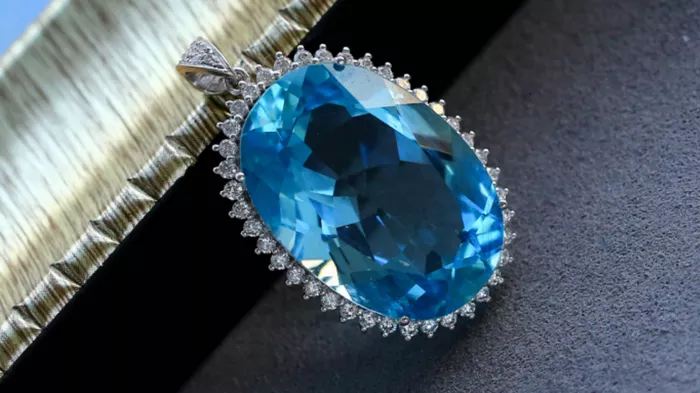Aquamarine rings are not just beautiful pieces of jewelry; they carry a rich history and a unique charm that makes them particularly appealing in the vintage market. When searching for a used aquamarine ring, it’s essential to understand various factors that contribute to its value, beauty, and authenticity. This article will guide you through the critical aspects to consider when selecting a vintage aquamarine ring, ensuring that you make an informed and satisfying purchase.
Understanding Aquamarine
The Gemstone Itself
Aquamarine is a member of the beryl family, known for its stunning blue to greenish-blue hues. The name “aquamarine” is derived from the Latin words for water (“aqua”) and sea (“marina”), aptly reflecting its tranquil colors. The most prized aquamarines exhibit a vibrant blue color reminiscent of tropical waters, devoid of any green or gray tints.
Key Characteristics of Aquamarine
Color: The ideal aquamarine features a rich, saturated blue. Lighter shades are more common but often less valuable.
Clarity: Aquamarines are typically very clear, with fewer inclusions than many other gemstones. The clearer the stone, the higher its value.
Cut: The cut of the gemstone significantly affects its brilliance and overall appearance. Popular cuts include oval, round, and emerald cuts, which can enhance the stone’s color and light reflection.
Carat Size: Larger aquamarines are often more visually striking, but quality should never be sacrificed for size. A balance between size and clarity is crucial.
What to Look for in a Vintage Aquamarine Ring
Authenticity and Provenance
When purchasing a vintage aquamarine ring, authenticity is paramount. Verify that the piece is genuinely vintage, ideally over 20 years old. Look for documentation or certificates from reputable gemological laboratories, which can confirm the stone’s authenticity and provide details about its characteristics.
Condition of the Ring
Inspect the overall condition of the ring. A well-maintained vintage piece will show minimal signs of wear. Look for scratches, chips, or any damage to the aquamarine or the setting. A ring that has been cared for will not only look better but will also retain its value over time.
Setting and Metal Quality
The metal used in the ring can significantly influence its overall appearance and durability. Vintage aquamarine rings are often set in gold (yellow, white, or rose) or platinum. Each metal can create a distinct look:
White Gold and Platinum: These metals enhance the blue of the aquamarine, providing a modern and elegant appearance.
Yellow Gold: Offers a classic contrast to the blue stone, often preferred for traditional styles.
Style and Design
Vintage aquamarine rings come in various styles, from Art Deco to Victorian. The design should reflect the wearer’s personal taste. Popular styles include:
Solitaire Settings: Highlight the aquamarine as the focal point.
Halo Designs: Surround the aquamarine with smaller diamonds or gemstones, adding sparkle and enhancing the ring’s size.
Intricate Vintage Designs: Often feature detailed metalwork, adding character and uniqueness.
See Also: Guide to Buying Zales Aquamarine Necklaces
Evaluating the Value of a Vintage Aquamarine Ring
Factors Influencing Value
Several factors contribute to the overall value of a vintage aquamarine ring:
Gemstone Quality: The color, clarity, cut, and carat weight of the aquamarine are primary determinants of value.
Craftsmanship: The quality of the setting and the intricacy of the design can significantly affect the ring’s worth.
Market Demand: Vintage jewelry trends can fluctuate, impacting the desirability and price of aquamarine rings.
Getting an Appraisal
Consider obtaining a professional appraisal, especially if you plan to invest a significant amount. An appraiser can provide an unbiased assessment of the ring’s value and authenticity, which is beneficial for insurance purposes.
Ethical Considerations
Sourcing and Sustainability
In today’s market, ethical sourcing is increasingly important. When purchasing a vintage aquamarine ring, inquire about the origin of the gemstone and the seller’s sourcing practices. Ethically sourced aquamarines support responsible mining and labor practices, ensuring that your purchase aligns with your values.
Caring for Your Vintage Aquamarine Ring
Maintenance and Cleaning
Aquamarine is a durable gemstone, but it still requires care to maintain its beauty. Here are some tips:
Regular Cleaning: Clean your aquamarine ring with mild soap and water, avoiding harsh chemicals that can damage the stone.
Avoid Extreme Temperatures: Protect the ring from extreme heat or cold, which can cause damage.
Store Properly: When not in use, store the ring in a soft cloth or a dedicated jewelry box to prevent scratches.
Professional Maintenance
Consider having your vintage aquamarine ring professionally cleaned and inspected regularly. A jeweler can check for loose stones, wear on the setting, and other potential issues, ensuring that your ring remains in excellent condition.
Conclusion
Choosing a vintage aquamarine ring can be a rewarding experience, combining beauty, history, and personal significance. By understanding the characteristics of aquamarine, evaluating the authenticity and condition of the ring, and considering ethical sourcing, you can make a well-informed decision.
Whether you are drawn to the calming hues of aquamarine or the unique charm of vintage jewelry, the right ring can be a cherished addition to your collection. Embrace the elegance of aquamarine, and let it be a symbol of serenity and timeless beauty in your life.


